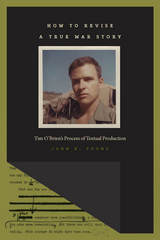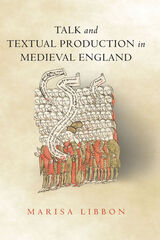2 books about Textual Production

How to Revise a True War Story
Tim O'Brien's Process of Textual Production
John K. Young
University of Iowa Press, 2017
“You can tell a true war story if you just keep on telling it,” Tim O’Brien writes in The Things They Carried. Widely regarded as the most important novelist to come out of the American war in Viet Nam, O’Brien has kept on telling true war stories not only in narratives that cycle through multiple fictional and non-fictional versions of the war’s defining experiences, but also by rewriting those stories again and again. Key moments of revision extend from early drafts, to the initial appearance of selected chapters in magazines, across typescripts and page proofs for first editions, and through continuing post-publication variants in reprints.
How to Revise a True War Story is the first book-length study of O’Brien’s archival papers at the University of Texas’s Harry Ransom Center. Drawing on extensive study of drafts and other prepublication materials, as well as the multiple published versions of O’Brien’s works, John K. Young tells the untold stories behind the production of such key texts as Going After Cacciato, The Things They Carried, and In the Lake of the Woods. By reading not just the texts that have been published, but also the versions they could have been, Young demonstrates the important choices O’Brien and his editors have made about how to represent the traumas of the war in Viet Nam. The result is a series of texts that refuse to settle into a finished or stable form, just as the stories they present insist on being told and retold in new and changing ways. In their lack of textual stability, these variants across different versions enact for O’Brien’s readers the kinds of narrative volatility that is key to the American literature emerging from the war in Viet Nam. Perhaps in this case, you can tell a true war story if you just keep on revising it.
How to Revise a True War Story is the first book-length study of O’Brien’s archival papers at the University of Texas’s Harry Ransom Center. Drawing on extensive study of drafts and other prepublication materials, as well as the multiple published versions of O’Brien’s works, John K. Young tells the untold stories behind the production of such key texts as Going After Cacciato, The Things They Carried, and In the Lake of the Woods. By reading not just the texts that have been published, but also the versions they could have been, Young demonstrates the important choices O’Brien and his editors have made about how to represent the traumas of the war in Viet Nam. The result is a series of texts that refuse to settle into a finished or stable form, just as the stories they present insist on being told and retold in new and changing ways. In their lack of textual stability, these variants across different versions enact for O’Brien’s readers the kinds of narrative volatility that is key to the American literature emerging from the war in Viet Nam. Perhaps in this case, you can tell a true war story if you just keep on revising it.
[more]

Talk and Textual Production in Medieval England
Marisa Libbon
The Ohio State University Press, 2021
People in medieval England talked, and yet we seldom talk or write about their talk. People conversed not within literary texts, but in the world in which those texts were composed and copied. The absence of such talk from our record of the medieval past is strange. Its absence from our formulation of medieval literary history is stranger still. In Talk and Textual Production in Medieval England, Marisa Libbon argues that talk among medieval England’s public, especially talk about history and identity, was essential to the production of texts and was a fundamental part of the transmission and reception of literature. Examining Richard I’s life as an exemplary subject of medieval England’s class-crossing talk about the past, Libbon advances a theory of how talk circulates history, identity, and cultural memory over time. By identifying sites of local talk about England's past, from law courts to palace chambers, and tracing rumors about Richard that circulated during his life and long after his death, Libbon offers a literary history of Richard that accounts for the spaces between and around extant manuscript copies of Middle English romances like Richard Coeur de Lion, insular and Continental chronicles, and chansons de geste with figures such as Charlemagne and Roland. These spaces, usually dismissed as silent, tell us about the processes of writing and reading and illuminate the intangible daily life in which textual production occurred. In revealing the pressures that talk about the past exerted on textual production, this book relocates the power of making culture and collective memory to a wider, collaborative authorship in medieval England.
[more]
READERS
Browse our collection.
PUBLISHERS
See BiblioVault's publisher services.
STUDENT SERVICES
Files for college accessibility offices.
UChicago Accessibility Resources
home | accessibility | search | about | contact us
BiblioVault ® 2001 - 2024
The University of Chicago Press









